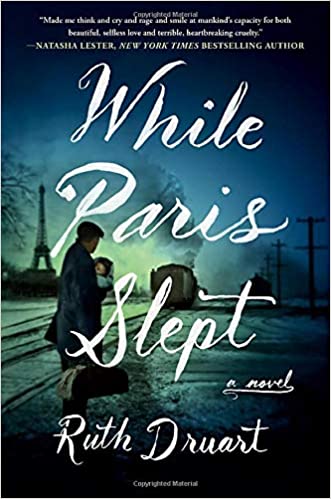[Note from Frolic: We’re so excited to have author Ruth Druart guest posting on the site today. She has some great tips for historical fiction writers. Take it away, Ruth!]
I love reading and writing historical fiction because not only do you get a gripping story, but you also learn something about a time in history.
Having been a teacher, I’ve seen how much more children learn when taught through story. After all, who wants to be presented with the dry facts? Boring! As were my history lessons at school when I was a child. I hated history and dropped it as soon as I could, but later fell in love with it through the power of a narrative. One of the first non-fiction books I read was Defying Hitler – A Memoir, by Sebastian Haffner. As it weaved a personal account in with the facts, I found it both fascinating and easy to read. I then went on to read Hélène Berr’s Journal 1942-1944, the diary of a young Jewish woman who was arrested in Paris in 1944 and sent to the death camp of Auschwitz. I also read The Night, by Elie Wiesel, an account of his time spent as a prisoner of Auschwitz, followed by his harrowing journey to freedom.
So, if you’re interested in writing this genre, I have some tips.
- Immerse yourself – read anything you can get your hands on to do with the time period you want to write about. Other novels written in that same period are a valuable resource, and don’t stop to ask yourself if they’re well-written or not; that’s not the point. You might be surprised at little gems that appear in someone else’s story. Then move onto non-fiction, checking out facts and reading more. Internet is a great resource, but personally I prefer to have hard copies of books that I can leaf through and stick post-its in.
- Travel to the place if you can. Not the time period! Soak up the atmosphere and try to imagine how it was years ago. When I wrote my chapters about Le Marais, in Paris 1953, I sat outside a café, taking in the surroundings, looking up at the apartments that my character, Sam, would have lived in, trying to see it through his nine-year-old eyes.
- Read personal accounts of people who lived through this time. Get your hands on diaries if you can. When I read Hélène Berr’s journal her descriptions of daily life in Paris during the occupation made me realize just how much people were trying to survive, while keeping some resemblance to normality, when in fact their world was crumbling apart.
- Remember how language has changed. Make sure your characters speak with words that would have been used back then.
- But remember that basic feelings don’t change. Love, jealousy, pride, dignity, hatred, selfishness are universal emotions whose relevance transcends time.
- Think about the clothes your characters would have worn. I looked up pictures on the internet for this and bought postcards of Paris during this time.
- Think about the music they would have listened to, the books they might have read.
- Don’t data dump. Build the world around the characters, but don’t be afraid to get creative with them and add your own spin. Okay, you’ve done your research, but don’t use your novel to show readers how much you know. They only care about the compelling characters you’ve created.
- Situate your characters in time by dropping in details about things happened at that time. Just little hints; don’t get heavy.
- Put your own questions about life, ideas and philosophies into your characters’ heads. Create a space for them to have debates and conversations about topics that are universal regardless of time period. After all, there’s a reason why history often repeats itself!
About the Author:
Ruth Druart grew up on the Isle of Wight, leaving at eighteen to study psychology. In 1993 she moved to Paris, the city that inspired her to write While Paris Slept. There she pursued a career in international education and raised three sons with her French husband. She recently left her teaching position, so she can write full time while running her writing group in Paris.
While Paris Slept by Ruth Druart, out now!
One woman must make the hardest decision of her life in this unforgettably moving story of resistance and faith during one of the darkest times in history.
Santa Cruz, 1953. Jean-Luc is a man on the run from his past. The scar on his face is a small price to pay for surviving the horrors of Nazi occupation in France. Now, he has a new life in California, a family. He never expected the past to come knocking on his door.
Paris, 1944. A young Jewish woman’s past is torn apart in a heartbeat. Herded onto a train bound for Auschwitz, in an act of desperation she entrusts her most precious possession to a stranger. All she has left now is hope.
On a darkened platform, two destinies become intertwined, and the choices each person makes will change the future in ways neither could have imagined.
Told from alternating perspectives, While Paris Slept reflects on the power of love, resilience, and courage when all seems lost. Exploring the strength of family ties, and what it really means to love someone unconditionally, this debut novel will capture your heart.













